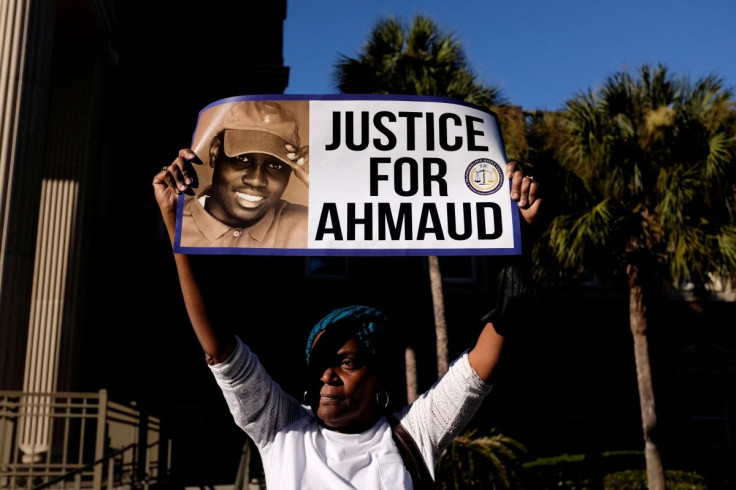Closing Arguments Begin In Ahmaud Arbery U.S. Hate-crimes Trial

The three white men convicted of murdering Ahmaud Arbery acted out of racial animosity when they chased down the young Black man as they saw him jogging through their Georgia community, a federal prosecutor told jurors at the defendants' hate-crimes trial on Monday.
Arbery, 25, out for an afternoon run, was seen as a criminal by the three men who pursued him to his death for no other reason but the color of his skin, Christopher Perras, a special litigation counsel for the U.S. Justice Department's civil rights division, said in closing arguments.
"They were motivated by racial assumption, racial resentment and racial anger," Perras said, referring to the defendants - Travis McMichael, 36; his father, former police officer Gregory McMichael, 66; and neighbor William "Roddie" Bryan, 52.
"They saw a Black man in their neighborhood and they thought the worst of him," Perras told the predominantly white jury in U.S. District Court in Brunswick, Georgia.
All three men are charged with violating Arbery's civil rights by attacking him because of his race, as well as with attempted kidnapping. The McMichaels are additionally charged with a federal firearms offense.
The hate-crimes felony, the most serious of the charges, carries a maximum penalty of life in prison.
The three men have already been convicted in state court of murder and sentenced to life in prison. The federal prosecution is the first in which those who carried out such a high-profile murder are facing a jury in a hate-crime trial.
The Arbery slaying, caught on cellphone video, was one of several of Black men and women - often by police - that helped reignite racial justice protests in recent years.
Legal experts and court observers say federal prosecutors proved their case while presenting testimony and evidence during the federal trial, but they cautioned that predicting what jurors will decide is tricky.
"The prosecution's theory is that they were inveterate racists," said Nirej Sekhon, a professor of criminal law at Georgia State University who has been following the case.
"They need to show that racism saturated every dimension of their lives and informed their decision to chase Mr. Arbery," he said in a telephone interview. "I believe that they've met that bar, that they can tether their (the defendants') mindset to their actions."
The defense rested its case on Friday after presenting only one witness to the jury of nine white people and three Black people. Legal observers say the defense doesn't have to prove anything but may rely on closing arguments.
RACIAL ILL WILL
The federal lawyers sought to prove the three acted out of racial ill will, buttressing their argument with a parade of witnesses and a racist digital footprint stretching back almost a decade.
A.J. Balbo, a defense attorney for Gregory McMichael, called Arbery's killing "an American tragedy," but said the three men were motivated by a desire to protect their neighborhood, not race.
To make his point, Balbo presented a witness who reported seeing a white homeless man living under a nearby bridge. Gregory McMichael made a similar report to police without specifying a race. The witness, however, wasn't positive it was the same incident.
Page Pate, a federal criminal defense lawyer from Brunswick, Georgia, who has been following the case closely, said he sees a win coming for the government.
"I was surprised by how much evidence of racial animus they found; they really dug deep," he said in a telephone interview.
On Friday, the prosecution presented testimony from witness Carole Sears, who is white, that in 2015 Gregory McMichael went on a rant against Black people after she remarked that civil rights standard-bearer Julian Bond had died.
She recalled him saying, "I wish that guy had been in the ground years ago," and "All those Blacks are nothing but trouble, and I wish they'd all die."
Travis McMichael had shared numerous racist messages online and once posted a video of a Black child dancing on Facebook, adding the song "Alabama Nigger" by Johnny Rebel, a recording artist whose work supported white supremacy.
Another white prosecution witness, Kristie Ronquille, testified on Friday that Travis McMichael, then her supervisor in the U.S. Coast Guard, subjected her to racist and sexual insults in 2011 after learning she had once dated a Black man.
Ronquille cried on the stand.
As for Bryan, numerous text messages and other online posts showed a long history of racist slurs and comments.
In text messages with a friend, Bryan said he was upset his daughter had started dating a Black man, and he used a racial epithet. In other online messages, he referred to celebrations on Martin Luther King Jr. Day as "monkey parades" and used other slurs.
Regarding the defense, Pate said the three men's attorney were smart not to rehash all the racist text messages and comments before the jury.
"It's difficult to try to confront the evidence of racial bias," Pate said. "They don't want to emphasize that to the jury. It's on social media, what are you (defense attorneys) going to do?"
The best defense strategy there is to say nothing until closing arguments, he said.
© Copyright Thomson Reuters {{Year}}. All rights reserved.





















